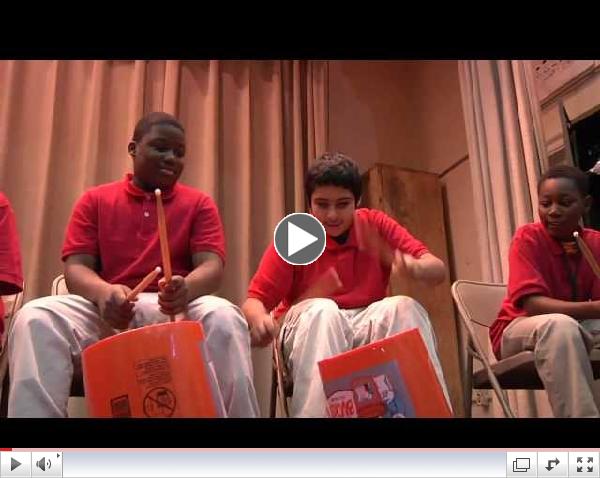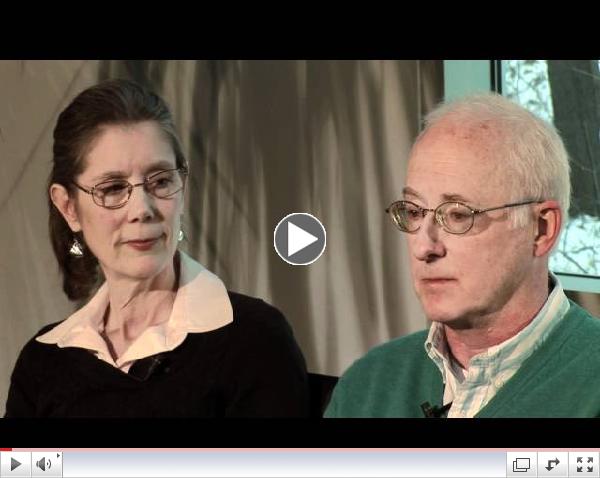|
|
|
|
|
|
 |
 |
 |
 |
 |
 |
 |
 |
 |
 |
 |
 |
 |
 |
 Two For The Gold: Collaboration At Its Best Danelle Umstead is a United States Olympian. She represents Team USA in Alpine Skiing, and will be competing soon in five downhill skiing events. Imagine the courage need ed to barrel down mountains at breakneck speeds. Now imagine doing so and not being able to see where you are going. That's what Danelle Umstead does. Danelle skis without the benefit of sight. Danelle's husband, Rob is the voice in her head. He serves as a guide for her as she makes the twists and  turns down the mountain. Their partnership is one of trust and reliance, one from which there is much to learn. They are a true team, a picture of collaboration. As Danelle represents our country in the Sochi Paralympic games next month, she will do so with courage, preparation, and collaboration. Please check out the video below. It's brief, but very powerful. You can follow Danelle and wish her well on Twitter @Vision4Gold . Want to do something REALLY powerful? Share Danelle's story with your students and teachers and ask them to follow her Olympic dreams on Twitter. It's a powerful teachable moment and a way for all of us to support our fellow American, Danelle Umstead. ~ MW for PM!  | | Two For Gold: Danelle and Rob Umstead Profile |
Thanks to NBC Sports, Gettys Images, and Deseret News for photos and clips. |
 |
Highlights from your state association!
Georgia School Leadership Development Conference - March 3-5, 2014
|
 |
|
FREE Ongoing Professional Learning With Your Colleagues
Join the conversation! Your colleagues are sharing ideas and learning from each other on a daily basis. Where do you find them? Twitter. Okay, but exactly where on Twitter?
 Bob Farrace, the Director of Communications and Public Relations at NASSP (farraceb@nassp.org or on Twitter @NASSP) is the hub of conversation for our principals across the nation, and shares the following link to a calendar of weekly Twitter chats by topic and by state. Jerry Blumenthal is the list's author. Thanks to both Bob and Jerry for sharing. Bob Farrace, the Director of Communications and Public Relations at NASSP (farraceb@nassp.org or on Twitter @NASSP) is the hub of conversation for our principals across the nation, and shares the following link to a calendar of weekly Twitter chats by topic and by state. Jerry Blumenthal is the list's author. Thanks to both Bob and Jerry for sharing.
LINK to the list: bit.ly/officialchatlist
Ready to chat tomorrow (Wednesday)? Here's the programming guide for you!
WEDNESDAYS
|
#iolchat
|
Inside Online Learning
|
12-1pm EST
| |
#LDchat
|
Conversation around Learning Disabilities
|
12-1pm EST
| |
#ELTchat
|
English Language Teachers
|
12-1 & 9-10pm GMT
| |
#ipadchat
|
Ipads in education Chat
|
1-2pm EST
| |
#specialedchat
|
Special Education Chat
|
4-5pm EST / 9-10pm GMT
| |
#educoach
|
Educational Coaching
|
4-5pm EST
| |
#AVIDchat
|
AVID related topics
|
5-6pm PST
| |
#web20tools
|
Web 2.0 Tools in teaching
|
6-7pm EST
| |
#IntEdchat
|
International Ed Chat
|
6-7 Beijing Time
| |
#STEMgeniushour
|
STEM Genius Hour
|
7-8pm PST
| |
#ctchat
|
Critical Thinking Chat
|
7-8pm EST
| |
#3rdchat
|
3rd Grade Chat
|
7-8pm EST
| |
#digcit
|
Digital Citizen Chat (2nd & 4th weeks of the month)
|
7-8 pm EST
| |
#edmusic
|
Music Education
|
7-8pm EST
| |
#TCRWP
|
Teachers College Reading Writing Project Chat
|
7:30-8:30pm EST
| |
#coachchat
|
Athletic coaches Chat
|
8-9pm EST
| |
#2ndchat
|
Second Grade Teachers Chat
|
8-9pm EST
| |
#libchat
|
Librarian's Chat
|
8-9:30pm EST
| |
#ntchat
|
New Teachers Chat
|
8-9pm EST
| |
#atchat
|
Assistive Technologies Chat
|
8-9pm EST
| |
#FLedchat
|
Florida Ed Chat
|
8-9pm EST
| |
#ncadmin
|
North Carolina Administrator Chat (every other Wednesday)
|
8-9 pm EST
| |
#bigbeacon
|
Transforming Engineering Education
|
8-9pm EST
| |
#cmsk12chat
|
Charlotte-Mecklenburg Schools
|
8-9pm EST
| |
#csk8
|
Computer Science Kindergarten - 8th Grade
|
8-9pm EST
| |
#psychat
|
Psychology Teachers Chat
|
8-9pm CST
| |
#nebedchat
|
Nebraska Ed Chat
|
8-9pm CST
| |
#azedchat
|
Arizona Ed Chat
|
8-9pm MST
| |
#miched
|
Michigan Ed Chat
|
8-9pm EST
| |
#uted
|
Utah Ed Chat
|
8-9pm MST
| |
#histed
|
History Education
|
8:30-9:30pm EST
| |
#txed
|
Texas Ed Chat
|
8:30-9:30pm CST
| |
#geomchat
|
Geometry Chat - Transitioning to Common Core
|
9-10pm EST
| |
#lived
|
Educational Issues Discussion from Livingston Co, MI
|
9-10pm EST
| |
#1to1techat
|
1:1 Teacher Chat
|
9-10pm EST
| |
#ndedchat
|
North Dakota Ed Chat
|
9-10pm CST
| |
#DTK12chat
|
Design Thinking Chat
|
9-10pm EST
| |
#enviroed
|
Environmental Ed Chat
|
9-10pm EST
| |
#jedchat
|
Jewish Ed Chat
|
9-10pm EST
| |
#psycchat
|
School Psychologist Chat
|
9-10pm EST
| |
#sblchat
|
Standards-based Learning (SBL); formerly Standards-based Grading
|
9-10pm EST
| |
#ptchat
|
Parent-Teacher Chat
|
9-10pm EST
| |
#teachchat
|
General Teaching Chat
|
9-10pm EST
| |
#yalitchat
|
Young Adult Literature Chat
|
9-10pm EST
| |
#fycchat
|
First Year Composition Chat
|
9-10pm EST
| |
#ohedtech
|
Ohio Educational technology
|
9-10pm EST
| |
#mbedchat
|
Manitoba educators
|
9-10pm CST
| |
#educoach
|
Instructional Coaching Chat
|
10-11pm EST
|
|
 |
 |
 |
|
The Principal as Meteorologist: Part Two
The story for 2014 so far in our nation? Weather. It's been severe! Storms, and snow and earthquakes. School closings in places that rarely ever close. The apocalypse? I hope not! For the Principal, however, another challenge. How do we keep everyone achieving when we are facing tough weather issues? Here's part two of "The Principal as Meteorologist", by Dr. Marcus Jackson. ~MW for PM!
Adjustments in the Learning Environment

Though seasonal changes have an impact on schools, the impact is not always a problem. If teachers resist the urge to slip into a lethargic state, they can energize their learners by using the seemingly calm months to intensify their focus on the curriculum. They are the meteorologist for their classrooms, as the principals are meteorologists for the entire school.
Approximately twelve weeks into the semester, I require my faculty to adjust their instruction. My teachers implement various differentiated instructional strategies such as curriculum compacting, flexible grouping, and tiered activities. These strategies help to break the monotony of teaching and learning. Though the teachers implement these strategies throughout the year, we monitor them administratively during the colder months to ensure that the teachers are meeting the needs of all learners. We provide in-house professional development to ensure the fidelity of the implementation process.
In doing so, we have seen great success, because we inspect what we expect and we get results. Teachers are students do not become complacent, but rather they remain energized throughout the year. The teachers capitalize on the mood-altering weather, because though the students are calmer, they are still sponges-they absorb this quality, core instruction, and they digest it, because it is delivered in manageable bits. This slight change has greatly impacted are summative assessment scores, because students are teachers form great habits during the long, cold months, and by January-it feels like spring. They returned renewed, as they were at the beginning of the year, and they are ready to take on the new semester, and all its challenges.
Furthermore, my administrative team is more nurturing during the winter months. We offer more incentives, such as free blue jean passes for teachers; we only require that they wear a school shirt or sweatshirt. Not only do they feel more relaxed, but insidiously, we bolster morale and school spirit! Our stakeholders see this, and they realize that we work as a cohesive unit. Some other incentives are our winter potlucks; teachers are naturally competitive, so they get in their kitchens and bake, steam, broil, and we break bread-together, as a family.
For the students, we host an annual fall festival, complete with cotton candy and pony rides. What a joy to see the students enjoying themselves; they do not even realize the added health benefit of the sun's vitamin D! We also have Homecoming Week to foster their school spirit. These high-energy days keep us on our toes, but more importantly, they allow the students an opportunity to be expressive.
The Chief Meteorologist
 | |
Punxsutawney Phil, a famous meteorologist
in his own right.
|
The perceptive principal will be a consummate meteorologist-one who will recognize that the changes in the educational climate are the result of the shifts in weather. By understanding the changes that will inevitably take place in students and teachers, the principal can implement incentive programs, offer more recognition, and be more supportive during the dreary seasons. This will help to allay autumnal anxiety and winter woes; the insightful principal will boost morale and foster intrinsic motivation in teachers and students that will produce positive, extrinsic results.

"The Principal as Meteorologist", author Dr. Marcus Jackson, Principal of Kendrick Middle School in Jonesboro, GA. Thanks to Dr. Jackson for sharing with all of us. If you have an article to share with your colleagues, you too can be published. Please send an email to: Mark Wilson at mark.wilson.ga@gmail.com to make a submission. |
 |

|
 |
 Necessity is the Mother of All Invention Rule Number 7: Necessity is the mother of all invention. Perhaps no teacher better exemplifies this steadfast rule than itinerant music teacher Jason Chuong. Tasked with teaching percussion at seven different public schools in Philadelphia on an annual budget of $100, Chuong bought a slew of plastic paint buckets from the Home Depot for $2.80 a pop, and introduced his students to the urban art of bucket drumming. Being strapped for resources and funding is part and parcel for all of these teachers (most of whom have undoubtedly reached into their own pockets many times over), but none view this as an excuse to do less. Whether it's making the best of what they have, as Chuong has, or tapping outside sources for support, as Mississippi teacher Peggy Carlisle has done by receiving more than $180,000 in grants over the course of her career-outstanding teachers will always search for and find ways to give their students what they need to thrive  | | Keeping the Beat: A Teacher Talks About Schools, Music Education, and the American Jobs Act |
 This is an excerpt from a blog written by Katrina Fried. It outlines the "Twelve Rules of Classroom Heroes." We will share the rules with you weekly in Principal Matters! If you can't wait to see them over time, you can read the article in its entirety here: http://www.weareteachers.com/community/blogs/weareteachersblog/blog-wat/2013/10/30/12-rules-for-classroom-heroes It's inspired from her best-selling book, American Teachers: Heroes in the Classroom, available at Amazon and at your favorite book-seller. |
 |
 |
|
Truth Is, English IS A Challenging Language

A little something from busyteacher.org to make you smile as we work to help students read, understand, and share. What about an assignment to find other words and phrases that seem out of sort? Maybe by finding the anomalies our students would understand the rules? It's worth sharing to your teachers and students.
|
 |
 |
|
Sparks of Genius:  The Thirteen Thinking Tools of the World's Most Creative People The Thirteen Thinking Tools of the World's Most Creative People
by Robert S. Root-Bernstein and Michele M. Root-Bernstein
Creativity isn't born, it's cultivated-this innovative guide distills the work of extraordinary artists and thinkers to show you how.
All the imagination needs to be fruitful is exercise. Robert and Michele Root-Bernstein identify the thinking tools employed by history's greatest creative minds-from Albert Einstein and Jane Goodall to Amadeus Mozart and Virginia Woolf-so
 that anyone with the right mix of inspiration and drive can set their own genius in motion. With engaging narratives and ample illustrations, Robert and Michele Root-Bernstein investigate cognitive tools as diverse as observing, imaging, recognizing patterns, modeling, playing, and more to provide "a clever, detailed and demanding fitness program for the creative mind" (Kirkus Reviews).  | "Art + Science = Innovation"
(Creative Impact Michigan 03.08.12) |
|
 |
 |
 On This Date... February 18, 1931 Happy Birthday, Toni Morrison Toni Morrison, Nobel Prize-winning novelist, is born this day in 1931 in Lorain, Ohio. Morrison was born Chloe Anthony Wofford to a welder father and homemaker mother. She graduated from Howard University in 1953, then took a master's in literature at Cornell. She married architect Howard Morrison and had two sons. After she and her husband divorced, Morrison taught English and worked as one of the very few black editors at Random House. She published her first novel, The Bluest Eye, in 1969, followed by Sula in 1973. She first came to national attention in 1978, however, when she won the National Book Critics Circle Award for Song of Solomon. 
After the publication of her breakthrough novel, she published Tar Baby (1981). Her 1987 novel, Beloved, the story of a 19th-century slave who escapes bondage but is forced to kill her own baby, won the Pulitzer Prize in 1988.
Morrison won the Nobel Prize in 1993, becoming the first African-American to win the award, as well as the first American woman in general to win in more than 50 years. The same year, a fire destroyed her Nyack, New York, home-fortunately, she'd left the manuscript of her next novel, Paradise, in her office at Princeton University, where she was teaching creative writing. The book, published in 1998, explored the dynamics of an all-black town in the late 1960s. Thanks to The History Channel for "This Day in History." You can sign up to receive daily updates on the events of the day at this link: http://www.history.com/this-day-in-history/toni-morrisons-birthday Thanks to the Visionary Project for sharing the following interview with the Nobel Prize Laureate! Enjoy.  | | Toni Morrison Talks About Her Motivation For Writing |
|
|
|
|
 |
 |
 |
 |
 |
 |
 |
 |
 |
 |
 |
 |
 |
 |
|
|
|
|
|